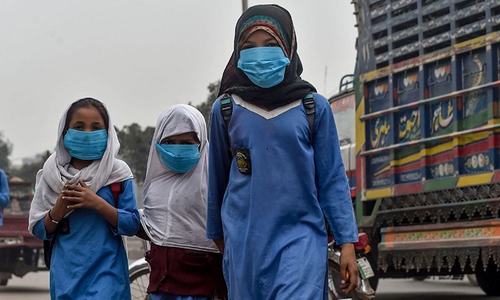ISLAMABAD: As the first phase of the opening of educational institutions is going to start on Sept 15, 2,000 teaching and non-teaching staff of public and private colleges have been tested for Covid-19 with only one found infected with the virus.
The infected person is a non-teaching staff member and contact tracing has been started to find out if any other person from the patient’s family and friends was infected.
As advised by the National Command and Operation Centre (NCOC), only important subjects will be taught in classes in shifts while the rest will be taken online.
According to a presentation given at a meeting, Islamabad has been divided into six zones to conduct sampling/monitoring and surveillance in both private and public-sector educational institutions.
As educational institutions set to open phase-wise, capital divided into three zones for sampling, monitoring
Each zone is headed by the area education officer (AEO) of the Federal Directorate of Education (FDE) while a monitoring officer (secretary, member/director) will supervise and coordinate the sampling as well as monitoring and surveillance part.
The meeting was attended by representatives of NCOC, FDE, Private Educational Institutions Regulatory Authority (Peira), owners and officials of private school associations, Ministry of National Health Services, the National Institute of Health and parents.
It was decided that there will be three tiers of monitoring to stop the spread of the virus. In the first tier, AEOs/monitoring officers will directly supervise educational institutions and principals in their area of jurisdiction.
The FDE director general and Peira chairperson will notify the percentage of schools to be visited by the AEOs daily to check compliance of standard operating procedures (SOPs) and regular reporting.
In the second tier, the directors colleges, schools, academics, sports, admin and deputy directors will carry out random inspections.
In the third tier, the FDE director general/deputy commissioner and additional deputy commissioner (east) will conduct snap visits and inspections.
A participant of the meeting said it was decided that a number of steps would be taken to curb the virus such as scrubbing/washing and sanitising the floor, door handles, chairs, crowd density management/spacing and disinfection of buildings.
“The participants were briefed about strict compliance of SOPs in educational institutions and on NCOC’s directions of massive administrative action on Sept 15 when the institutions will reopen,” he said.
According to another document, available with Dawn, sampling is being carried out in urban area I and II, Tarnol, Bhara Kahu, Sihala and Nilor.
Some of the schools where sampling has been done are Islamabad Model School for Girls (IMSG) G-6/2, IMSG G-6/1-3, Islamabad Model School for Boys (IMSB) G-6/4, IMCG G-9/3, IMCB G-10/3, IMSG Humak, IMCB Rawal Dam, IMSB Tarlai and IMCB No 15, Chak Shahzad.
When contacted, Additional Deputy Commissioner East Dr Asif Rahim said all possible efforts were being made to ensure that the virus would not bounce back.
“All representatives of NCOC and ministries of health and education have been working to curb the virus through implementation of SOPs. The district administration has been playing its role to keep the whole team on their toes,” he said.
According to data released by the capital administration, 28 cases of Covid-19 were reported on Friday.
“Seven cases were reported from F-7, three each from I-8 and Tarnol, two each from I-14, G-9, G-7 and F-8, one each from Korang Town, Khanna, I-10, G-13, F-7, F-6 and Bhara Kahu.”
Published in Dawn, September 13th, 2020















































